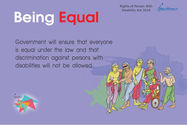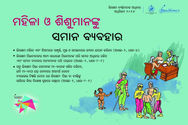History of RPwD Act.
Over the past two-and-a-half decades, Swabhiman has been at the forefront of many path breaking initiatives in disability rights advocacy. These include rights based laws for disabled in India, a separate department for disability in Odisha, inclusion of disability as a separate category in the national census, making polling booths accessible, and most recently, the formation of India’s new disability rights law, the RPwD Act, 2016. The most powerful human rights law, our most awaited and long pending, “Rights of Persons with Disability Act 2016 (RPwD Act 2016)” got passed as the law of the land by both the houses of Parliament in December 2016. This landmark human rights law ensures persons with disabilities receive the same civil rights protections as all other Indians. It is a game changer.
Journey to RPwD Act 2016.
Addressing the issues of people with disabilities through the lens of “equality” surfaced in India in the early 1980s, more particularly with the declaration of the year 1981 as International Year of Disabled Persons. But, 1996 was the year when the historic change happened in India. After a series of petitions and protests, the government passed the Persons With Disabilities (Equal Opportunities, Protection of Rights and Full Participation) Act, 1995 (or PWD Act). It was succeeded in, in both visibility by numbers (Census 2001) and voting rights (Elections 2004), though each preceded by huge protests, rallies, self-immolation drives and symbolic assemblies. The greatest weakness was the law that penal provisions for violating the provisions of the 1995 Act were weak. Further, the Officer of Chief Commissioner and State Commissioner for PwDs was not vested with enough strength and power. It also had limited focus on social security i.e. only financial assistance and insurance coverage. The recreational approaches were ignored. Moreover, there was no protection against discrimination.
After India signed and ratified the UNCRPD (United Nations Convention on the Rights of Persons with Disabilities) in 2007, the process of enacting a new legislation in place of the Persons with Disabilities Act, 1995 began in 2010 to make it compliant with the UNCRPD (United Nations Convention on the Rights of Persons with Disabilities). After six years of lobbying, advocating and waiting patiently during days of disruptions and adjournments in the heated Winter Session of the Parliament in 2016, India finally witnessed the compassion of Parliamentarians with the unanimous passage of the much awaited Rights of Persons with Disabilities (RPwD) Bill on 14th December, 2016 in the Rajya Sabha and subsequently in the Lok Sabha on 16th December, 2016. The Bill was further approved and signed by the Hon'ble President before the year end and 'notified' by the Government in its official Gazette on 28th December, 2016. This Law is a game changer for the estimated 70-100 million disabled citizens of India with its strong rights based backbone.
In the new Law, Disability has been defined based on an evolving and dynamic concept and the types of disabilities have been increased from existing 7 to 21 and the Central Government will have the power to add more types of disabilities. Speech and Language Disability and Specific Learning Disability, acid attack and Parkinson’s disease have been added for the first time. The new Law provides for penalties for offences committed against persons with disabilities and also violation of the provisions of the new law. Special Courts will be designated in each district to handle cases concerning violation of rights of PwDs. Reservation in vacancies in government establishments has been increased from 3% to 4% for certain persons or class of persons with benchmark disability. The Office of Chief Commissioner of Persons with Disabilities has been strengthened who will now be assisted by 2 Commissioners and an Advisory Committee comprising not more than 11 members drawn from experts in various disabilities. Every child with benchmark disability between the age group of 6 and 18 years shall have the right to free education.
RPwD Act in Posters (ENGLISH).
The posters have used Raghurajpur Art, which is a folk art of Odisha and is internationally acclaimed. It has been designed by one of the contemporary artists from Odisha, Mr. Veejayant Dash, also an advisor to the National Gallery of Modern Art, New Delhi.






















